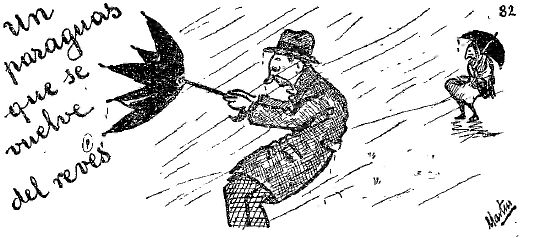
| Языки :: Испанский |
| Аудио |
 |
|
|
239 |
Español |
Spanish |
|
Lección Ochenta y dos (82) |
||
| No lo crea usted | Do not believe him. | |
| 1 |
Más que el rey. — Yo mando en mi casa más que el rey en la suya. — ¿Cómo es ello? (1). |
More than the king. — I command in my house more than the king in his. — How's that? |
| 2 | Pues, muy sencillo; el rey manda las cosas sólo una vez y se las hacen; (2) | It is very simple; the king orders things once and they do them for him at once; |
| 3 | yo suelo en mi casa mandarlas veinte veces y no las hacen. | I am wont, at home, to order them 20 times and they don't do them. |
| 4 |
En la escuela. El maestro. — ¿Qué árbol da las aceitunas? El discípulo. — Ninguno. — Sí hombre, el olivo. — No señor, no las da, se las quitan (3). |
At school — The teacher. — What tree gives olives ? — The pupil. — None. — Yes, certainly, the olive-tree. — No, sir, it doesn't give them. They take them from it. |
| 5 |
¿ No cree usted en la amistad? ¿Por qué? — Porque la amistad es uno de esos paraguas |
You don't believe in [the] friendship? Why? — Because friendship is one of those umbrellas |
| 6 | que se vuelven del revés en cuanto hace mal tiempo (4). | which turn inside out as soon as there is bad weather. |
| 7 |
¡Cochero! ¿Cuánto me costaría la carrera hasta la estación? — Una peseta. — ¿Y el equipaje? — Dos reales (5). |
Cabman! How much would cost me the run from here to the station? — One peseta. — And the luggage? — Fifty centimes. |
| 8 | Entonces cargue (6) el equipaje, que yo iré a pie detrás del coche. | Then load on the luggage, and I'll go on foot behind the carriage. |
| EJERCICIOS | EXERCISE : | |
| En el tren. | In the train. | |
| 1 | Se prohíbe escupir en el suelo. | It is forbidden to spit on the ground. |
| 2 | Es peligroso asomarse. | It is dangerous to lean out. |
| 3 | Departamento reservado; Fumadores; Señoras; Correos. | Reserved compartment; smokers (only); ladies (only); Mail. |
| 4 | ¿Permite Vd. que baje el cristal, que hay corriente (de aire) ? | Allow (me) to lower [that I lower] the window, there is draught (of air). |
| 5 | ¿Me hace el favor de subir el cristal? | Will you please [do me the favour to] raise the window? |
| 6 | ¡Cuidado! la portezuela está mal cerrada. | Mind! the door is not well [badly] shut. |
| 7 | Haga el favor de prestarme su guía por un momento. | Please, lend me your guide-book for a moment. |
| 8 | Permita que ponga su maleta en la red; que baje su maleta de la red. | Allow me to put your suitcase in the rack. |
| 9 | Tenga cuidado, que es muy pesada. | Take care, [that] it is very heavy. |
| 10 | ¿Cuál es la próxima estación? | What is the next station? |
| 11 | ¿Tenemos tiempo para bajar? | Have we the time to go out? |
| 12 | ¡Viajeros al tren! | Take your seats! |
| 13 | ¿Permite que apague la luz, que baje la luz, que encienda la luz? | Allow me to switch off the light, to dim down the light, to switch on the light? |
| 14 |
Buenas noches. — Que Vd. descanse. |
Good night. — Sleep well [may you rest] ! |
| NOTES. | |
| 1 |
¿ Cómo es ello? or ¿ Cómo es eso? — Mandar, to order (ordenar) or send (enviar). — ¡A mi mando!, To my command! — Mándele Vd. a paseo : send him about his business. — To order something in a shop (en un almacén), at a restaurant, is pedir (to ask). He pedido tila, I have ordered o lime (-blossom tea). |
| 2 |
A peculiarity which will puzzle you for a few more lessons : I
explain it to him should be "yo lo le explico "; but the
dative (to him) is put before "it" : I explain to him
it; and to make it worse, the dative le changes into se, and we have : yo se lo explico, se meaning: to you, to him, to her, to them, according to the case. — Yo se lo diré, I shall tell it you, or tell it him. — ¿No ha visto usted mis estampas? Yo se las ensenaré : You have not seen my engravings (or pictures)? I shall show them to you. — Sus zapatos (de usted) están listos; se los enviarán (or mandarán) : your shoes are ready; they will send them to you. Se los preparan : They prepare them for you. |
| 3 |
Quítese el abrigo (el gabán) : Take off your overcoat
(cloak). — Un quitasol, a parasol ("take off-sun"). — Este asunto me quita el sueño : This affair takes sleep from me. |
| 4 | En cuanto, as soon as. |
| 5 | Un real (royal) : 25 céntimos. |
| 6 |
Cargar, to load, yo cargo, Vd. carga, I, you load, in the imperative the g becomes gu to preserve its sound : ¡ cargue ! load! |
| Asomarse a la ventana : to lean out of the window. | |
|
Notice the subjunctives : yo bajo, I lower; que yo baje,
that I (should) lower; yo apago, I put out; que yo apague, that I (should) put out (infin. apagar), yo enciendo, I light; que yo encienda (inf. encender), that I (should) light; Vd. descansa, you rest; que Vd. descanse, may you rest (inf. descansar); yo pongo, I put, que yo ponga : that I (should) put (inf. poner). Vd. tiene, you have or hold. Tenga Vd. : have or hold. |
